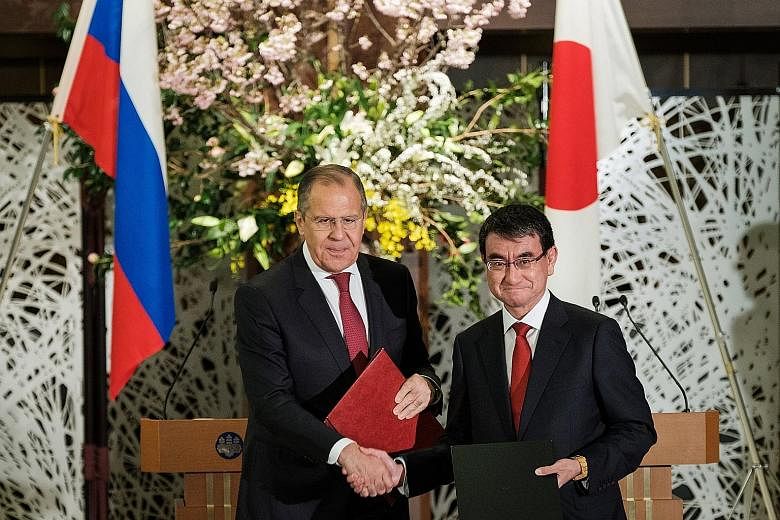Japan's planned deployment of the American Aegis Ashore anti-missile system is an obstacle to Moscow improving ties with Tokyo, Russian Foreign Minister Sergey Lavrov said yesterday.
The roll-out, slated for 2023, will inevitably affect Russia's national security directly, Mr Lavrov told a news conference in Tokyo after more than 2½ hours of talks with Japanese counterpart Taro Kono.
Mr Kono, in turn, stressed to reporters that the land-based missile interceptor system will "purely be defensive and managed independently by our country" with the aim of improving Japan's capability against the North Korea threat.
"It will not pose any threat to neighbouring countries, including Russia," he said.
Moscow is claiming American overreach in the deployment that, it suspects, is part of a broader United States missile defence network being developed worldwide. It has been cynical of Tokyo's reassurances and believes that when push comes to shove, Japan will yield control of the system to the US - its ally.
In February, two months after Japan formalised its decision on the Aegis system, Moscow signed a decree to allow its military to use a civilian airport on a disputed island controlled by Russia and claimed by Japan, in what is seen as a diplomatic tit for tat.
This law could pave the way for a Russian air force unit to be deployed on the Iturup/Etorofu island, the largest of four islands at the centre of a longstanding row.
The islands, north of Hokkaido, are known to Japan as the Northern Territories and to Russia as the Southern Kurils. They were seized by the former Soviet Union in the final days of World War II.
The spat has stopped both countries from signing a peace treaty until today. The two ministers yesterday pledged their countries will cooperate to counter what they framed as "non-traditional security threats". They announced a series of "strategic dialogues" to commence next month in Moscow at the vice-foreign ministerial level.
Engaging in dialogue over such issues as North Korea, Mr Kono said, "is a crucial step to deepen our mutual understanding, so that a peace treaty can eventually be reached".
Tokyo was Mr Lavrov's first diplomatic stop after Russian President Vladimir Putin's big win in Sunday's presidential election.
The visit was meant to lay the groundwork for a summit between Mr Putin and Prime Minister Shinzo Abe at the end of May.
Mr Abe has invested considerable effort in wooing Mr Putin, with both leaders having had more than 20 face-to-face meetings.
This led to a deal in December 2016 to allow visa-free visits for Japanese descendants to pay respects at their ancestral graves.
Significantly, they also agreed to conduct joint economic activities on and around the disputed islands. But progress has been slow.
For one thing, both sides have yet to iron out the details of a special arrangement such that the projects - in five areas including tourism and aquaculture - will not compromise their respective legal positions on their sovereignty over the islands.
Dr James Brown, an expert in Russo-Japan ties at Temple University Japan, expressed pessimism, given Moscow's readiness to play hardball. "They have put the cart before the horse, by agreeing first on the types of projects and not their legal basis," he told The Straits Times.
Of Japan's fine balancing act between the US and Russia, Dr Brown said: "It is very difficult to fully detach the Russia-Japan relationship from the Russia-US relationship.
"The Aegis Ashore will go ahead, and will be a point of continued friction between Russia and Japan."

